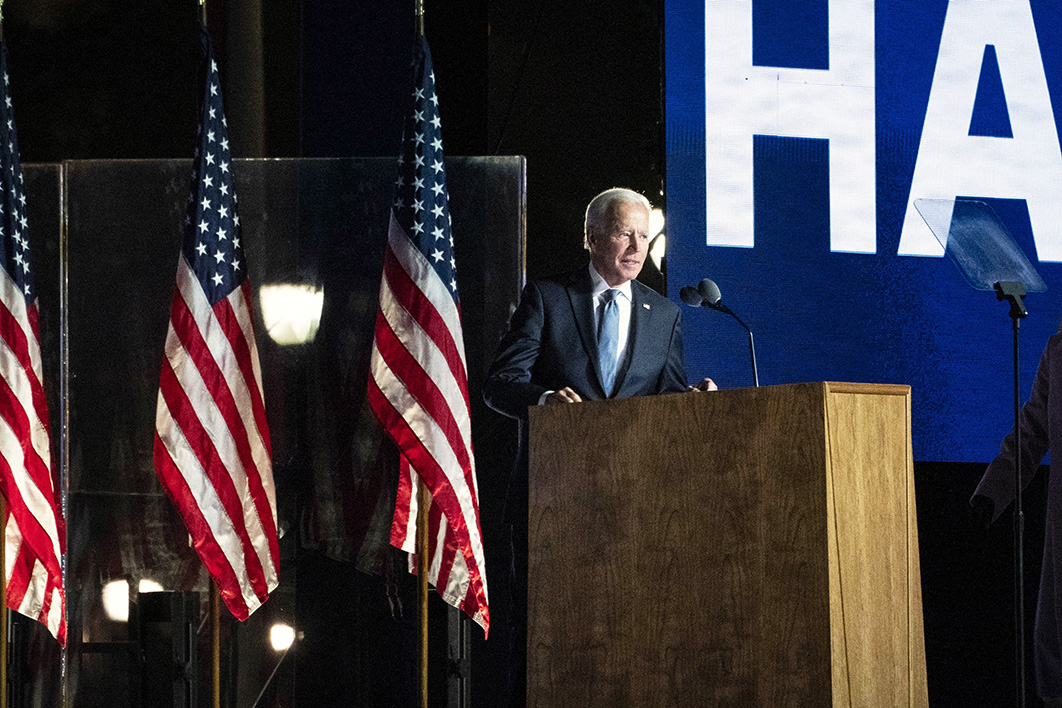Published 3am Wednesday, Washington time
The United States has just been through one of the most dramatic of all presidential campaigns against a backdrop of vicious partisanship, growing unrest and a largely uncontrolled pandemic that has killed around 250,000 people. To add to the pain, the election result isn’t yet clear in the early hours of the morning after election day, and probably won’t be known for several days.
This might be the most important election in our lifetimes, a critical moment for a nation in crisis and a world facing complex challenges. The size of the turnout (both early and on the day) attests to voters’ awareness of that fact.
As I write this, Joe Biden is ahead in the popular and electoral college votes, but key states including Pennsylvania, Wisconsin and Michigan can’t yet be called. Although he appears to have lost some states he was hopeful of winning, he is still more likely than Trump to gain the 270 electoral college votes necessary to take office.
Whether Democrats will win back the Senate is also unclear. A failure to do so would hamstring Biden’s capacity to make key appointments and pursue his legislative program. Whatever the final outcome, this isn’t the result Democrats hoped for; but neither is it the one Trump touted.
Trump voters see his return for four more years as the nation’s safeguard against internal threats from socialism, anarchy and violence, and external threats from nuclear attack and biased trade deals. They are worried about the erosion of their freedoms and fearful of “big government.”
Biden voters primarily want a return to normalcy. That means bringing the pandemic under control, creating the conditions for people to go to work or school, and seeing Congress and an administration focused on dealing with their needs and concerns, including high-quality affordable healthcare, education, climate change and racial justice. They abhor Trump’s language and behaviour and their impact locally and internationally.
Essentially, though, the election was a referendum on Trump’s management of the coronavirus pandemic. But even that issue played out in a highly partisan way, with CNN exit polls showing that about seven in ten Trump voters say the economy should have priority over containing the coronavirus, while nearly eight in ten Biden voters see managing the pandemic as more important than rebuilding the economy. Trump supporters view law and order as important; Biden supporters rank racial equity higher.
For Australians, it is shocking to see the Trump administration, despite the pandemic’s huge toll and impact on the healthcare system, still pressing the US Supreme Court to abolish Obamacare. Yet, with local economies in ruins and job losses climbing, people still came out to vote in such substantial numbers for Trump and the Republicans.
On the other hand, despite the Biden campaign’s efforts not to repeat the recognised failures of Hillary Clinton’s 2016 campaign, and despite Biden’s commitment to the Black Lives Matter cause, it is clear that there was a failure to pay sufficient attention to the concerns of African Americans and Latinos, perhaps because their support was taken for granted.
The behaviour of the candidates late on election night was typical of the way the campaign was conducted. Biden made a public statement saying “it ain’t over yet” and calling on people to be patient. Trump tweeted that Democrats are trying to steal the election, then gave a speech that derided current counts as “a fraud on the nation,” prematurely declared victory, and pledged to ask the US Supreme Court to stop further counting of votes. This was incendiary stuff, the like of which has not been seen before on election night in the United States. As anticipated, Trump is trying to delegitimise the election process.
As reported by Jonathan Swan of Axios, Trump and his White House have long planned to ensure that election night didn’t end with a concession speech. He apparently talked through in some detail plans to declare victory if it looks like he’s “ahead,” even if large numbers of votes were still uncounted in Pennsylvania and other key states.
While he denied he would do this, he then went on to state that ballots should not be collected and counted after election day. “I think it’s terrible that we can’t know the results of an election the night of the election… We’re going to go in the night of, as soon as that election’s over, we’re going in with our lawyers… [I]f people wanted to get their ballots in, they should have gotten their ballots in long before that.”
Typically, this kind of wrangling has been pre-empted when news outlets have declared winners on the night of the election using partial counts and exit polls, which allow them to see how much of the vote is going to which candidate and calculate whether a candidate has a path to victory.
What happens now is that the electoral process proceeds as it has always done, slowed a little because of the enormous numbers of early ballots to be counted under rules that differ from state to state. Each state has its own laws governing when it needs to certify the election’s results, and none stipulate election day itself. (Biden’s home state of Delaware, in fact, is the only state that will certify its results within the same week as election day.) Most states will certify their results in the last two weeks of November, with some extending until the second week of December. The winner should be clear well before then, however.
In the lead-up to the election, American voters described their fundamental unease about America’s future. The delay in a clear result will test whether the American people can at least unite in exhibiting patience with the process, and whether the nation’s institutions are strong enough to withstand authoritarian efforts to override due process. •




